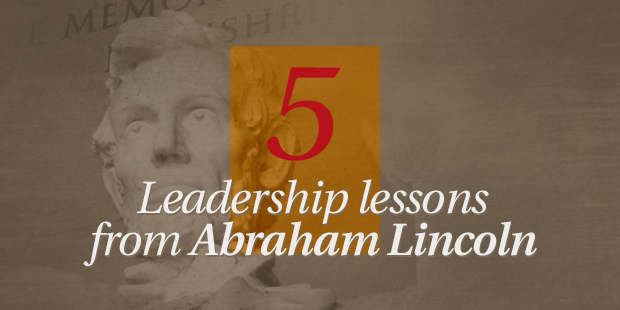
5 Leadership Lessons from Abraham Lincoln
When I discovered a new movie on the life of Lincoln was in the works, I was curious to learn more about Lincoln’s administration and his political career. The fhit movie is based on Doris Kearns Goodwin’s popular book, Team of Rivals: The Political Genius of Abraham Lincoln, a masterful telling of Lincoln’s story that follows the lives of each of his cabinet members.
Here are a few leadership lessons from the life of Lincoln as described in the book.
Lesson #1: Know When to Act and When to Wait.
Lincoln knew when to speak and when to remain silent. He knew when to act and when to wait.
In reading the book, I found myself on occasion wanting Lincoln to hurry up and make a decision, only to later discover that making his views public too soon would have sabotaged his chances for seeing lasting change. Whether he was hiring or firing, giving speeches or staying silent, he had an uncanny ability to gauge public opinion. He usually waited for the public to catch up with him before making pronouncements.
At the same time, Lincoln wasn’t afraid to lead. When he knew his actions would likely sway more people to his point of view, he got out in front of them and acted. But he only did so when he was sure he wouldn’t lose the people lagging behind. He was keenly aware of what Malcolm Gladwell called “the tipping point.”
Lesson #2: Don’t Take Things Personally.
Lincoln was hard to offend even when offense was warranted. For example, consider the brashness of General McClellan, who once kept Lincoln and secretary of state William Seward waiting in his parlor until he decided he wasn’t up for visitors and went to bed. As the reader, I wanted to climb into the pages and get in McClellan’s face to yell, “This is the president of the United States!”
Likewise, when cabinet member Salmon Chase undermined Lincoln and sought in vain to replace him on the Republican ticket in 1864, Lincoln shrugged off Chase’s ambitions, saying, “He has the White House fever.” Not only did he choose not to begrudge Chase’s antics, Lincoln later recommended him for the Supreme Court as Chief Justice.
And who can forget William Seward’s arrogant snubbing of his future boss? Seward received more than forgiveness; he received a lifelong friendship.
Though others were astonished at Lincoln’s forgiving spirit, Lincoln knew his responsibilities were too important to let personal squabbles keep him from the task at hand. By not seeking to establish his honor, Lincoln became all the more honorable.
Lesson #3: Be Strategic in Your Diversions.
Some cabinet members muttered about Lincoln’s frequent attendance at the theatre. The times were too serious for such trivial pursuits, they thought.
But Lincoln chose to be refreshed precisely because the times were serious. Compare pictures of Lincoln during the first year of his presidency compared to the last. It’s obvious the horror of war and the personal loss of a child weighed heavily on him.
To maintain his vibrant spirit, Lincoln planned a daily carriage ride every afternoon with his wife – a few precious moments to unwind and hear of other things. He frequented the theatre, where he would lose himself in the humorous plays and musicals of the day. It was because Lincoln took his job so seriously that he looked for ways to relieve the pressure of his office.
Lesson #4: Tell a Story and Paint a Picture.
Lincoln’s oratorical skills are legendary, but not everyone in his day was impressed. Many thought he was a hick, a country “railsplitter” from Illinois who wouldn’t amount to much as president.
But Lincoln knew the power of a story. That’s why his speeches are full of analogies, pictures, and anecdotes. Being a “commoner” was a badge of honor that helped him communicate to the men who gave their lives on the battlefield, the families who buried their young, and the slaves who desired their freedom.
Lincoln had plenty of practice in story-telling. His humor is well-documented by his contemporaries. He kept his kids up at night with tales of adventure. Though pictures often show him looking dour and depressed, the real Lincoln was a jovial man who knew the power of a story.
Lesson #5: Do the Right Thing Even When It is Costly.
There are times when Lincoln was under enormous pressure to fire members of his cabinet, to make changes in personnel, or to hold back on issues related to emancipation. Lincoln could have succumbed easily to outside pressure. Quick decisions might have given him immediate popularity.
But Lincoln understood the fickle nature of politics and refused to bow to the heat of the moment. He decided to do the right thing and accept the fallout. He took responsibility for his administration’s mistakes even when his subordinates were at fault. At personal cost to himself, Lincoln chose the high road, sometimes paying for it in initial political strategy, only to find respect from his countrymen increasing over time.
Conclusion
Lincoln was a great president because he was a great man. Team of Rivals shines light on the wisdom of his strategies and decisions.
Read more from Trevin here.

Tags: Leadership Development, Team, Team of Rivals, Trevin Wax












